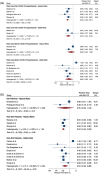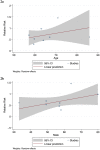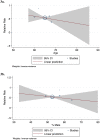The protective association between statins use and adverse outcomes among COVID-19 patients: A systematic review and meta-analysis
- PMID: 34166458
- PMCID: PMC8224908
- DOI: 10.1371/journal.pone.0253576
The protective association between statins use and adverse outcomes among COVID-19 patients: A systematic review and meta-analysis
Abstract
Introduction: Statins may reduce a cytokine storm, which has been hypothesized as a possible mechanism of severe COVID-19 pneumonia. The aim of this study was to conduct a systematic review and meta-analysis to report on adverse outcomes among COVID-19 patients by statin usage.
Methods: Literatures were searched from January 2019 to December 2020 to identify studies that reported the association between statin usage and adverse outcomes, including mortality, ICU admissions, and mechanical ventilation. Studies were meta-analyzed for mortality by the subgroups of ICU status and statin usage before and after COVID-19 hospitalization. Studies reporting an odds ratio (OR) and hazard ratio (HR) were analyzed separately.
Results: Thirteen cohorts, reporting on 110,078 patients, were included in this meta-analysis. Individuals who used statins before their COVID-19 hospitalization showed a similar risk of mortality, compared to those who did not use statins (HR 0.80, 95% CI: 0.50, 1.28; OR 0.62, 95% CI: 0.38, 1.03). Patients who were administered statins after their COVID-19 diagnosis were at a lower risk of mortality (HR 0.53, 95% CI: 0.46, 0.61; OR 0.57, 95% CI: 0.43, 0.75). The use of statins did not reduce the mortality of COVID-19 patients admitted to the ICU (OR 0.65; 95% CI: 0.26, 1.64). Among non-ICU patients, statin users were at a lower risk of mortality relative to non-statin users (HR 0.53, 95% CI: 0.46, 0.62; OR 0.64, 95% CI: 0.46, 0.88).
Conclusion: Patients administered statins after COVID-19 diagnosis or non-ICU admitted patients were at lower risk of mortality relative to non-statin users.
Conflict of interest statement
The authors have declared that no competing interests exist.
Figures




References
-
- Chow R, Elsayed S, Lock M. How robust are the results of one of the first positive trials of hydroxycloroquine for treatment of COVID-19? medRxiv 2020
Publication types
MeSH terms
Substances
Grants and funding
LinkOut - more resources
Full Text Sources
Medical

